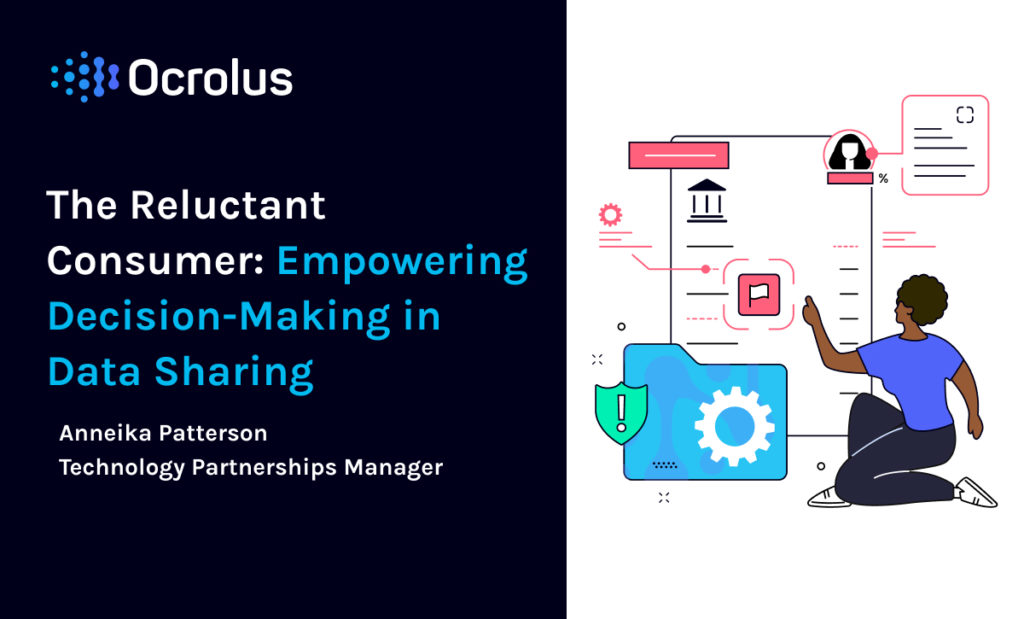This website uses cookies so that we can provide you with the best user experience possible. Cookie information is stored in your browser and performs functions such as recognising you when you return to our website and helping our team to understand which sections of the website you find most interesting and useful.
The Reluctant Consumer: Empowering Decision-Making in Data Sharing

Giving customers the power to safely control their personal data is the key to streamlining automation in the financial services sector. This requires the implementation of consumer-permissioned parameters for accessing data and sharing documents.
Consumer-permissioned data is mission-critical for transactional businesses, such as online banking, borrowing, and electronic payments. This is data that a consumer has given a business or another third-party permission to access.
The increasing importance of digital data
Regulations such as the General Data Protection Regulation (GDPR) in the European Union and the California Consumer Privacy Act (CCPA) represent government efforts to protect consumers from losing control of their personal data. A report on the impact of the CCPA underscores that many consumers believe they have a right to know what personal information about them is being shared—and they want the ability to control the distribution of that information.
Fintechs, in particular, are collecting increasing amounts of customer data to automate everything from loan processing to product pricing to market analytics. In order to comply with regulatory requirements– and consumer preferences–financial institutions are embedding what is sometimes referred to as “privacy by design” guardrails that automate data protection and protect sensitive customer information. These privacy by design safeguards set a baseline for data protection in an increasingly digital transaction environment.
A recent working paper on digital technology risks for finance, published by the Harvard Kennedy School, noted that the potential for misuse and abuse of digital data is a widespread concern among consumers. In addition to protecting privacy, fintechs also need to safeguard data, protect against scams, comply with government regulations, and ensure transactional transparency.
Yet, at the same time, consumers have grown accustomed to granting permission for access to financial data that streamlines transactions, such as bill payments, money transfers, and other online banking activities. While digital transactions facilitate data access, they also eliminate the paper trail that characterized most legacy banking activity. Digital banking balances the elimination of paper receipts with an online ledger that helps to ensure that financial information is never lost.
Open banking regulations are still evolving as fintechs and government authorities implement policies and requirements related to sharing data with third parties. But the general consensus among lenders and regulators is that consumers who opt-in to data sharing agreements also need a way to opt-out.
As a Financial Data and Technology Association report noted, fintech innovation needs to include policy changes and comprehensive oversight to secure and protect personal financial data. What’s more, the report said, consumers should have control over their own information and the ability to monitor and regulate data flows, revoke access, and request retroactive deletion of their data.
Streamlining the permission process
Regulatory and governance issues related to data privacy will continue to grow as more personal financial information is digital. While consumers are often willing to allow automated review of financial documents, many are hesitant to share login information that would enable data to be harvested directly from their online accounts.
According to a PYMTS.com report, 42% of American consumers worry about the security of bank account credentials shared with third parties. The report also noted that while digital payment methods are becoming ubiquitous for making purchases, more complex transactions require access to individual bank accounts and personal financial documents.
Automation in the financial services sector hinges on the willingness of customers to share their bank account credentials with third parties. Automation is increasing as banks and other lenders go beyond simple online banking. To facilitate more complex transactions, such as mortgages, fintechs will need to streamline the permission process for accessing online personal data, as well as for digitizing personal financial documents.
Building a trusted ecosystem
While lenders are empowering customers to dictate how their information is shared, they are also working to provide a secure transaction environment that makes customers feel safe. As a McKinsey report on digital banking noted, capturing value from open financial data requires that consumers and lenders trust the system and the infrastructure for financial data sharing. That trust facilitates technology adoption for document automation and open financial data.
Open financial data enables fintechs to provide products and services that appeal to a broad segment of the consumer market. Moreover, an integrated automation solution facilitates the use of both consumer-permissioned data and personal financial documents.
Unlocking access to automated document review can improve the lending process for both consumers and fintechs. Unlike manual document review and processing, Ocrolus automatically recognizes and classifies documents with great accuracy. The ability to use decision-ready data means that documents, such as loan applications, can be reviewed faster and more accurately. That saves money and time for lenders, reduces bad loan costs, and improves customer experiences.
In the gig economy, with fewer workers on standard payrolls, automated intelligent document processing also provides lenders with access to the alternative financial documents necessary to verify income and assets. In fact, some borrowers may be motivated to grant lenders permission to access online data and personal financial documents because it will facilitate the review and processing of loan applications.
Transforming reluctant consumers into satisfied customers requires fintechs to t make safeguarding personal data and privacy a priority as well as standard practice.
Learn more about how Ocrolus facilitates automated document processing.






